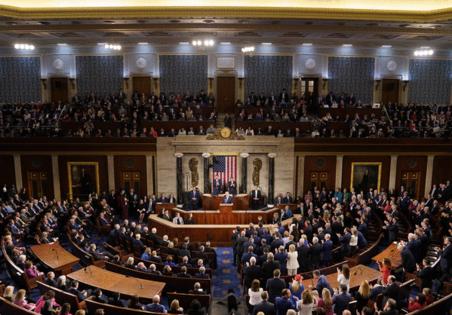David M. Drucker: Term limits won't fix what's wrong with Congress
Published in Op Eds
Support for imposing term limits on the U.S. Congress is gaining steam, with at least half a dozen state legislatures approving resolutions urging a cap on service in the House of Representatives and the Senate. It stands to reason.
Congress’ job approval ratings are perennially in the tank, and a fresh Quinnipiac University poll reveals more of the same. In the survey, Republicans, who control both chambers, received positive marks from just 32% of registered voters. Democrats fared even worse, garnering a meager 21% approval rating. Many Americans across the political spectrum believe term limits would invigorate Capitol Hill, forcing older lawmakers to make way for new faces, loosening the stranglehold of politics and donors on lawmaking and enabling policy outcomes more responsive to their priorities.
They’re wrong — especially on that last part. Rather than making members of the House and Senate more responsive to the voters, term limits would shift power from veteran, experienced lawmakers to unelected staffers, executive branch bureaucrats and K Street lobbyists, none of whom would be subject to term limits. Just ask longtime political operatives in California, who have watched firsthand the impact of term-limits on the state legislature.
Early in my career, I was a statehouse reporter in California, covering a legislature that limited assembly members to three, two-year terms and senators to two, four-year terms. Reform was minimal; political jockeying to reach the next elected position was rampant; and the work product generally was mediocre because novice lawmakers who didn’t know what they were doing quickly assumed committee chairmanships and political leadership.
Rob Stutzman, a veteran Republican operative in Sacramento, describes it as a “transfer of institutional power” from elected officials to unelected government professionals and lobbyists.
The experience was failure enough that in 2012 Californians approved Proposition 28, a voter initiative that overhauled term-limits.
To solve the myriad problems created by letting inexperienced lawmakers govern the state with America’s largest population and biggest economy, voters agreed to extend the years of service allowed in either chamber of the legislature to a dozen years (six, two-year terms in the assembly and three, four-year terms in the senate).
But there was a trade-off. To sell voters on increasing the number of assembly and senate terms politicians can serve, the total years they are permitted to serve in the legislature overall were reduced from 14 to 12. And that means many of the governing pitfalls Proposition 28 aimed to address have lingered.
“Senior committee staff consider themselves members since they feel they know more than these neophyte legislators,” said David Louden, a Republican operative who previously served as chief of staff to four members of the California legislature. These legislative aides “end up driving the policy of the committee, as opposed to the legislator,” he added.
But cautionary tales about the potential downsides of terms limits have failed to dissuade voters from their firm belief that limits on Congressional service are the antidote for what ails the House and Senate. Over 80% of Americans support Congressional term limits.
That would require a constitutional amendment.
As political writer John Fund reports for National Review, six legislatures — Indiana, Louisiana, North Dakota, South Carolina, South Dakota and Tennessee — have approved resolutions “calling for an Article V convention to impose term limits on Congress,” with Arizona and Ohio poised to do the same. (A convention would only be triggered if 34 states passed such a resolution.) Meanwhile, there also is support for congressional term limits brewing in Congress.
Freshman Senator Dave McCormick and fifth-term Representative Brian Fitzpatrick, both Republicans from Pennsylvania, have jointly proposed amending the Constitution to put a ceiling on congressional service. Their plan would limit senators to two, six-year terms and House members to six, two-year terms, so that no politician could spend more than a dozen years in either chamber. To encourage support for the measure, McCormick and Fitzpatrick would exclude members who were elected before the 2022 midterm elections.
“Our Founding Fathers never imagined that Congress would become an institution filled with career politicians who stay on well past retirement age,” McCormick said in a statement. The senator’s point about politicians who stick around beyond the standard retirement age is particularly resonant in a political era with so many elderly political leaders — a development that has left many Democratic, Republican and independent voters hungry for new leadership.
On this front, Stutzman pointed out that California’s term-limits law has been effective.
“At a time when the U.S. Senate is as old as it’s ever been, term limits in California have certainly led to a younger legislature,” he said. “There were certainly decades-long incumbents that were finally forced to move on once term limits took effect.”
My opposition to congressional term-limits notwithstanding, I get the appeal.
Roughly a dozen years before I took up political reporting, in the fall of 1990, I voted for Proposition 140, implementing term-limits on the California legislature. Get the career politicians out, I figured. Get imaginative industry professionals with real-world skills in. They would go to Sacramento and focus on good governance and solving problems, I thought, because constitutionally constrained tenures would free them from worrying about reelection.
Then, in the winter of 2003, I started covering the statehouse and saw the consequences of my vote up close. It had only made things worse. I can only imagine what would happen in Washington, especially with presidents who take a rather expansive view of their executive powers.
____
This column reflects the personal views of the author and does not necessarily reflect the opinion of the editorial board or Bloomberg LP and its owners.
David M. Drucker is columnist covering politics and policy. He is also a senior writer for The Dispatch and the author of "In Trump's Shadow: The Battle for 2024 and the Future of the GOP."
©2025 Bloomberg L.P. Visit bloomberg.com/opinion. Distributed by Tribune Content Agency, LLC.

























































Comments